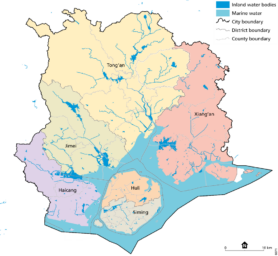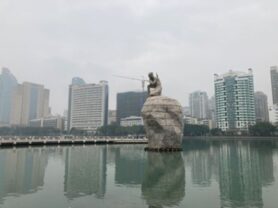Xiamen: The River Chief System
The River Chief System (RCS) is an innovative approach to water governance in China, aimed at improving river quality through collaborative governance. It assigns the responsibility of river management and protection to local political leaders within Party committees and governments. The RCS addresses the often-unclear division of responsibilities and tasks in the water management sector by having local leaders oversee planning and coordinate efforts among various levels of government, public departments, and jurisdictional governments, as well as between state and non-state actors. Additionally, the performance of river chiefs is considered as a key factor in officials’ career advancement.

The map of Xiamen with territorial borders and inland water bodies (from the author)
Located in Fujian Province in southeastern China, Xiamen covers an area of approximately 2,090 km² and had a population of 4.29 million with an urbanization rate of 90% as of 2019. The city is divided into six districts and 42 counties and is traversed by nine rivers totaling 215 km in length. Historically, Xiamen’s water environments were severely polluted due to rapid industrial development and population growth starting in the 1980s. The city’s rivers and lakes are also vulnerable to external pollutants due to their small water volumes. By 2014, over 80% of the surface water was classified as “below-grade-five”, the lowest water quality standard in China.
In October 2014, the Xiamen municipal government launched the River Chief System with the issuance of the Working Opinions on Implementing the River Chief System. This marked the beginning of the Xiamen RCS. In 2017, the system was comprehensively upgraded with the Implementation Plan of Xiamen Comprehensive Implementation of River Chief System. In March 2018, Xiamen introduced a dual river-chief system, appointing both the Party Secretary and the Mayor as municipal river chiefs to enhance the Party and government’s responsibility for water pollution control. The RCS in Xiamen operates within a hierarchical three-tier structure: municipal, district, and county levels. At each tier, leaders from the Party Committee and the government serve as river chiefs. For example, the Mayor of Xiamen and the General Secretary of the Xiamen Party Committee serve as municipal river chiefs. These officials have the authority to direct public entities at both equivalent and subordinate administrative levels. Additionally, intermediate RCS offices have been established at each administrative level to support the river chiefs. Xiamen has one Municipal RCS office, six District RCS offices, and 42 County RCS offices. These offices manage tasks such as collecting water-related information, preparing reports, conducting river patrols, holding monthly joint meetings, and coordinating various forms of collaboration.

Yundang Lake in Xiamen (from Xiaomeng Zhou, April 2022)
The Xiamen Municipal RCS Office has also explored ways to engage non-state actors in water environment protection. An example of this is the “civilian lake chief” initiative for Yundang Lake. With an area of 1.6 km², Yundang Lake was significantly polluted due to heavy sewage discharge in the past. Since 1988, Xiamen has undertaken four major sediment cleaning projects to improve the lake’s water quality. In May 2020, the Management Measure for Yundang Lake in Xiamen Special Economic Zone was officially implemented. Based on this management measure, Yundang Lake Conservation Center (hereafter the Center) established the position of civilian lake chief. After a month-long registration period and selection process, including interviews and final meetings, three citizens with relevant skills or extensive volunteer experience were chosen as civilian lake chiefs. Their responsibilities included lake inspections, reporting water-related issues, gathering public opinions, promoting lake protection policies, and encouraging the public to protect the water environment. They also participated in meetings held by the Center and raised questions during these meetings.
Today, Xiamen’s surface water quality has significantly improved. In 2020, no water bodies in the city were classified as “below-grade-five water,” and Xiamen received the highest level of public satisfaction with environmental quality in Fujian Province.

